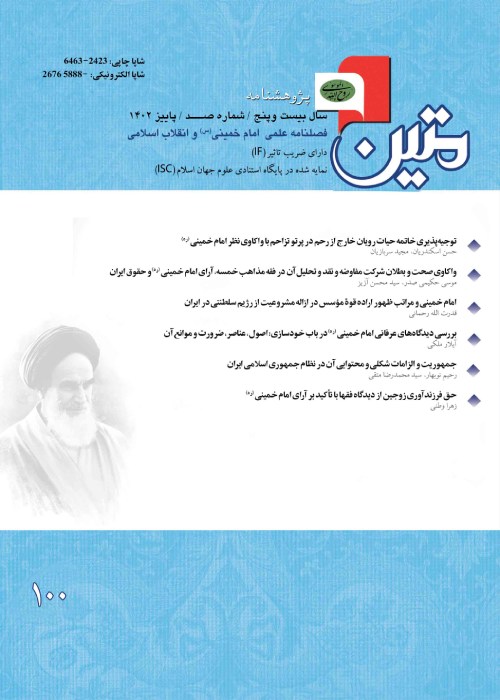A Comparative Study of Singing in Islamic Jurisprudence with an Approach based on Imam Khomeini's Views
Author(s):
Article Type:
Research/Original Article (دارای رتبه معتبر)
Abstract:
Given the obscurity of the texts at hand on definition of the word "singing", it is the subject of heated discussions and expert-level opinions presented in various branches of jurisprudence in Islamic sects. Some appraisers have constituted their views on singing based on such key concepts as joyful music, music for material pleasure, and its harmony with the sinful gatherings. Some definitions have been regarded as mere explanations that must be discerned by the commonsense. It is clear that with respect to the obscurity in the concept of singing, the rules on signing will be diversified accordingly. To that end, Imam Khomeini in his valuable juridical texts written during the years before the victory of Islamic Revolution has argued that human voice is the first criterion in defining the act of singing. He argues that human voice with inherent tenderness and beauty that is capable of arousing material pleasure for different types of people, will be an instance of the inherent prohibition of singing, otherwise exceptions shall be based on valid reasons. However, after the victory of Islamic Revolution and upon the innovation of the theory of time and place and his strong belief in the subjective transformability of rules, Imam Khomeini as an avant-garde and rational jurist - has reviewed his juridical rule on jurisprudential subjectivity of singing due to the change in its function and delegated the authority of discernment of the validity of singing to commonsense. It should be noted that at the time of Revelation, singing was only for material pleasure and a means of ignoring the memory of God.
This paper reviews various juridical opinions from Shia and Sunni jurists on singing, analyzes the reasons and evidences for and against it, scrutinizes exceptions to the juridical rule on prohibition of singing and some of its branches, and concludes that commonsense is the most fitting criterion in determining the juridical rule on singing because of the obscurity of the definitions on singing in religious texts and the functional change in the juridical subjectivity of the word.
This paper reviews various juridical opinions from Shia and Sunni jurists on singing, analyzes the reasons and evidences for and against it, scrutinizes exceptions to the juridical rule on prohibition of singing and some of its branches, and concludes that commonsense is the most fitting criterion in determining the juridical rule on singing because of the obscurity of the definitions on singing in religious texts and the functional change in the juridical subjectivity of the word.
Keywords:
Language:
Persian
Published:
Matin, Volume:19 Issue: 77, 2018
Pages:
45 to 64
magiran.com/p1845004
دانلود و مطالعه متن این مقاله با یکی از روشهای زیر امکان پذیر است:
اشتراک شخصی
با عضویت و پرداخت آنلاین حق اشتراک یکساله به مبلغ 1,390,000ريال میتوانید 70 عنوان مطلب دانلود کنید!
اشتراک سازمانی
به کتابخانه دانشگاه یا محل کار خود پیشنهاد کنید تا اشتراک سازمانی این پایگاه را برای دسترسی نامحدود همه کاربران به متن مطالب تهیه نمایند!
توجه!
- حق عضویت دریافتی صرف حمایت از نشریات عضو و نگهداری، تکمیل و توسعه مگیران میشود.
- پرداخت حق اشتراک و دانلود مقالات اجازه بازنشر آن در سایر رسانههای چاپی و دیجیتال را به کاربر نمیدهد.
In order to view content subscription is required
Personal subscription
Subscribe magiran.com for 70 € euros via PayPal and download 70 articles during a year.
Organization subscription
Please contact us to subscribe your university or library for unlimited access!


